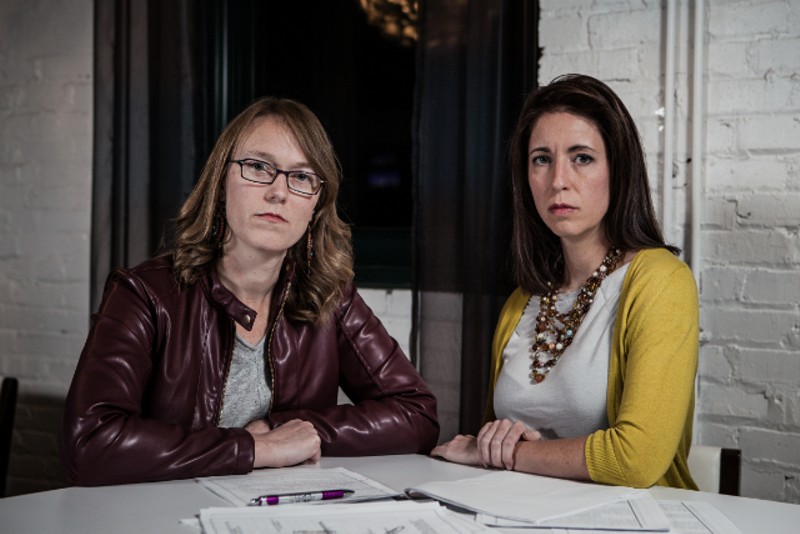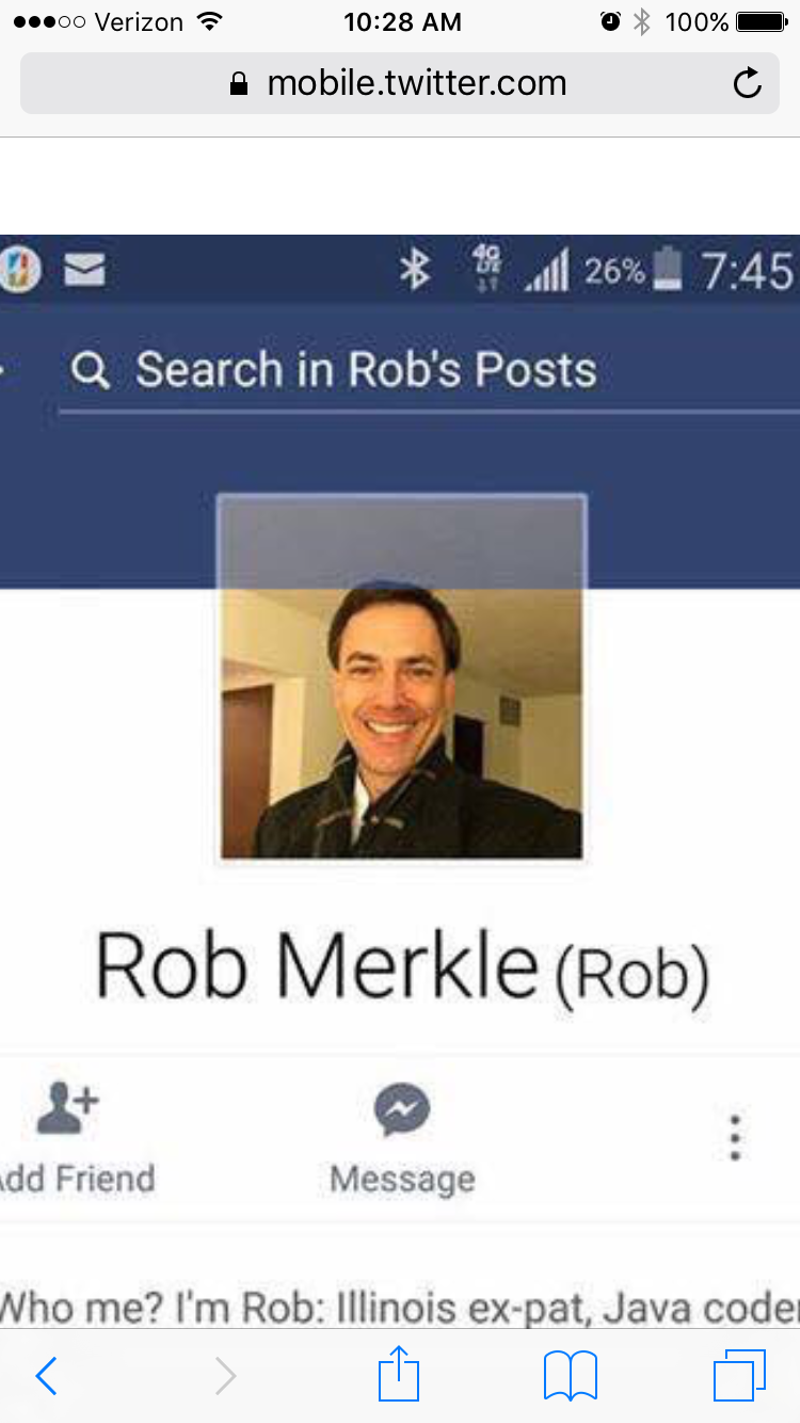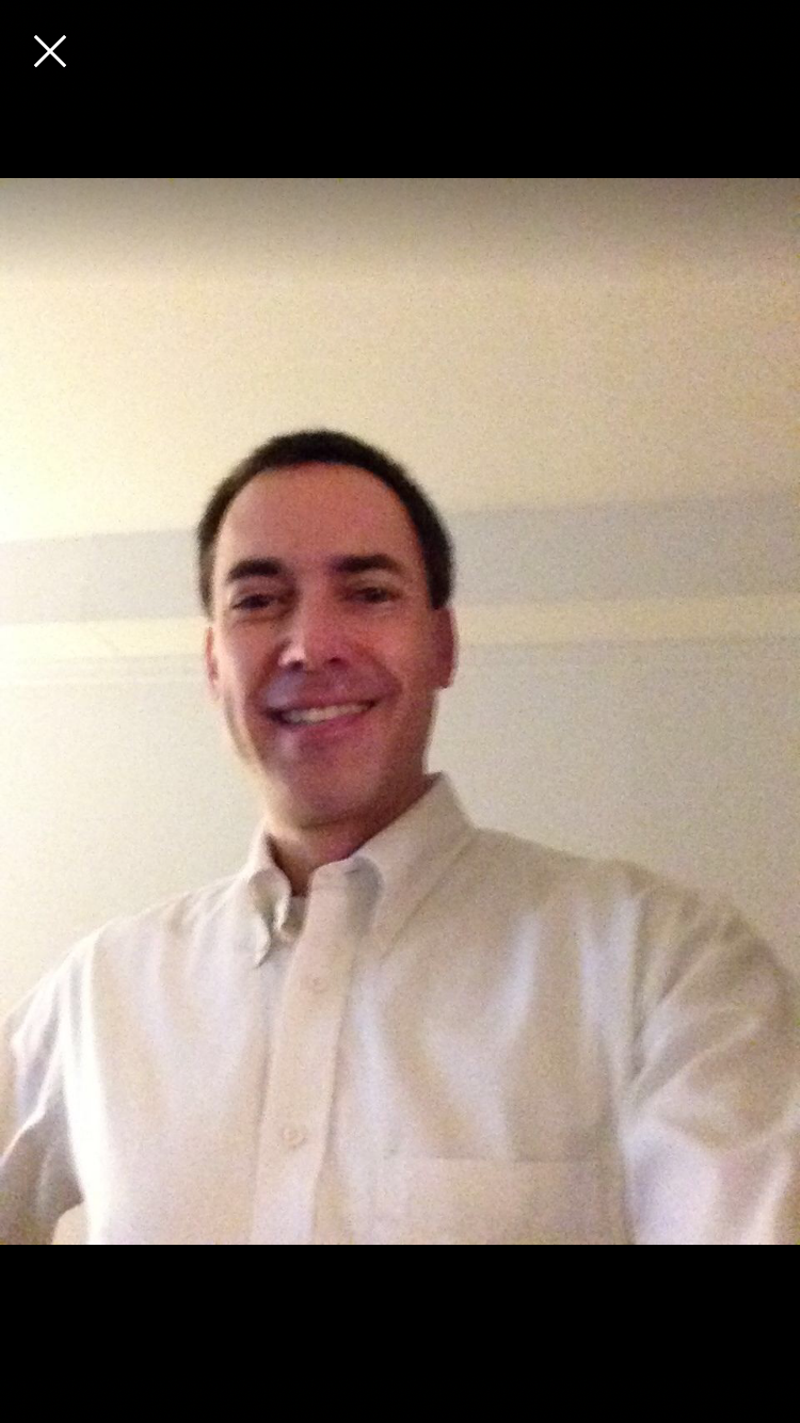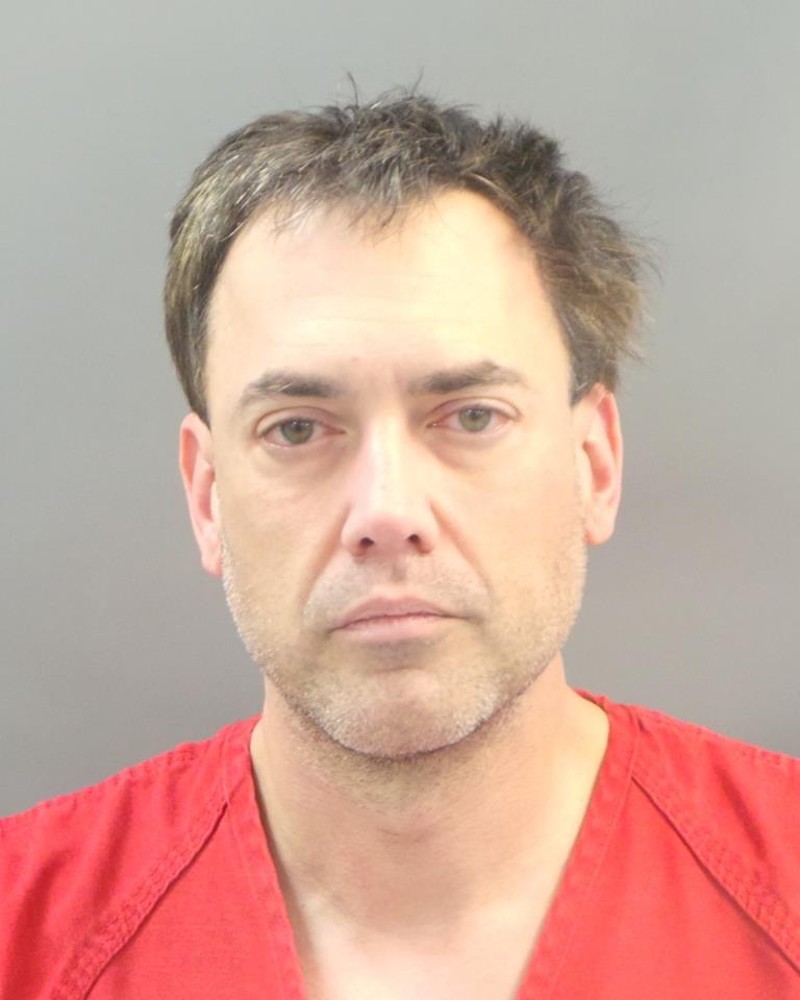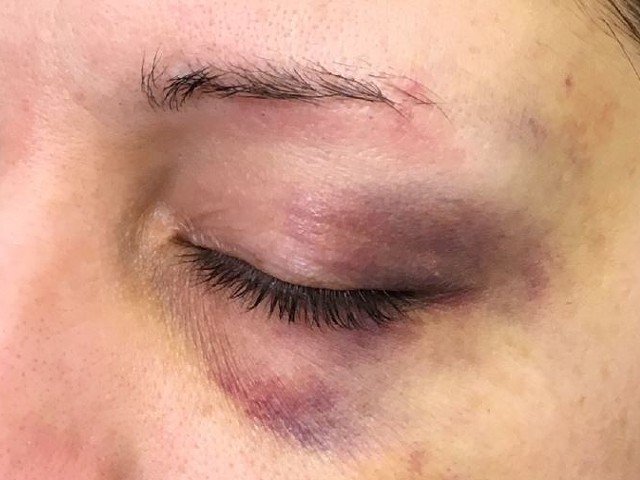Robert Merkle Terrorized Multiple Women, Yet Already Has a Parole Board Date
[
{
"name": "GPT - Leaderboard - Inline - Content",
"component": "41932919",
"insertPoint": "5th",
"startingPoint": "3",
"requiredCountToDisplay": "3",
"maxInsertions": 100
}
]
Robert Merkle, who turned the slimmest of connections with local women into campaigns of sustained terror, is scheduled for a parole hearing in January.
The 49-year-old south St. Louis County man was sentenced just last month to three years in prison for his second and third felonies, but with credit for time served since his arrest in February, he will have the opportunity to make his first request for early release a little more than a week into the new year.
On paper, Merkle was sentenced to a dozen years of hard time — a trio of three-year terms on felony harassment charges and three more one-year terms for misdemeanor counts. But on the recommendation of the St. Louis Circuit Attorney's Office, Judge Rex Burlison decreed that the sentences for Merkle's five St. Louis cases would be served concurrently — meaning, simultaneously — with a previous conviction and three-year sentence in Jefferson County.
Now women targeted by Merkle's threats and harassment fear he'll come after them again — and they say weaknesses and failures of the justice system have put them in danger.
"The man threatened to rape me," says Angela, one of the women whom Merkle terrorized. (The RFT is only using first names at the victims' request.)
She and Merkle were strangers. In August 2017, he came to a discussion group she attends at Dressel's Public House in the Central West End, and though they barely exchanged a sentence, he then began stalking her through Meetup.com, the platform used to organize the group. When she skipped a subsequent meeting, he sent her messages saying he was disappointed because he had planned to rape her that night "completely without your consent or desire," explaining, "I much prefer it when women are extremely unwilling to perform sex acts with me."
It was part of a pattern. Merkle trawled for women online and in real life. Brief interactions — sometimes as tenuous as sitting near a woman and learning her name — fueled obsessions that quickly escalated to him sending horrifying messages, usually describing his desire to be sexually violent with them. He often used aliases, calling himself James or David, which made identifying him more difficult. A former IT worker, he tracked down personal details about his victims and their families that the women had not shared with him.
Rebecca knew him only as Rob. They met through a dating site and went out once in February 2017. She says the evening was unremarkable and Merkle seemed normal enough in person. Then he began texting her.
He was aggressive, eventually prompting her to tell him to leave her alone.
Over the next 24 hours, he sent more than 30 messages, switching numbers and growing furious.
"I'm your conscience," he texted. "I've come here to kick ass and chew bubble gum, and I'm all out of bubble gum. You do the math."
Given that many of the women had only brief interactions with Merkle and knew little about him, they initially struggled to get police to act. But Angela was able to push an investigation with the help of friends, one a St. Louis cop and another a computer wiz who worked back through Merkle's various social media profiles to link him to multiple instances of abuse.
The case eventually was assigned to St. Louis Police Detective Martin Garcia. Angela and Rebecca says he took them seriously, kept them informed and actively went after Merkle. They cite his work as one of the few bright spots in what has become a long-running nightmare.
But almost every other interaction with the justice system has been frustrating at best. One example Angela cites was her failed attempt to get a restraining order in November 2017.
Merkle had continued to pursue her through Meetup.com. He could look at her profile and see which groups she attended, giving him times and locations he might find her. He had also started harassing Angela's friend, whom he briefly sat next to at the discussion group.
After a vile and disturbing message to the friend using his actual name, Merkle quickly claimed he had been hacked and deleted his profile. But he soon returned to the site under aliases and asked the leader of the discussion group to readmit him.
On November 15, 2017, Merkle posed as "David" and RSVPed to an event scheduled for that night at Schlafly Bottleworks in Maplewood, one Angela had also RSVPed to attend.
In a panic, Angela rushed from work to file the paperwork for a restraining order. She managed to submit the forms just before the deadline to have them reviewed that day, but her application was rejected without explanation. She also spoke to another detective who advised her to call police if Merkle showed up.
Angela was frightened about possibly seeing her harasser in person, but going to Schlafly also seemed like the only way to draw him out and get law enforcement to act. Her boss accompanied her and they alerted friends and the bartender, who also kept watch through the nerve-wracking evening.
Merkle never showed. Angela learned later that St. Louis police, based on some of the complaints, had put out a "wanted" on him — asking other officers to take him into custody if he was spotted. Kirkwood police intercepted him that evening shortly before the event. Angela wonders if he had been on his way to make good on his threats.
Knowing that Merkle had also harassed her friend, Angela posted on Facebook to see if there were other victims. She also did a pair of TV news interviews. Her hunch was right. More women came forward, contacting her and the police. Angela and Rebecca say they've learned at least eighteen women spoke with police, although some were too frightened to go further and only six of the cases led to charges.
One of the women who saw Angela on the news was a Jefferson County woman who had been harassed by Merkle since 2016 after rejecting his advances on a dating site. She had been having trouble getting police to pay attention, but Angela helped connect her to St. Louis investigators and reporters. That helped get the case moving, and Merkle was charged in February in Jefferson County.
In June, he pleaded guilty to felony harassment in that case. The Jefferson County judge described his behavior as "despicable" and sentenced him to three years. Heartened by the judge's strong condemnation, Angela assumed more time would follow in the St. Louis cases.
That didn't happen.
Instead, she says, she had to repeatedly call the St. Louis Circuit Attorney's Office to keep tabs on the cases. Even then she felt like she was mostly in the dark. She says she knew little about the criminal justice system and was left flailing as she tried to figure out how best to protect herself.
For example, she had assumed someone might tell her what to expect in her grand jury testimony and which parts of her story might be important. A significant factor in determining whether harassment is a misdemeanor or felony depends on how much a victim is harmed, but Angela was under the impression that the most important part was that Merkle was a stranger. She says she went into the grand jury blind, and the man who tormented her for months was indicted on a misdemeanor — not the felony she was hoping for.
Susan Ryan, a spokeswoman for the St. Louis Circuit Attorney's Office, says prosecutors pursued Angela's case as a felony. They can't be blamed, she says, for the grand jury's decision to treat it as a misdemeanor.
But Angela says during her testimony, a prosecutor asked her just one question — whether she went to work after Merkle's threats. She said yes. If the impression was that she had shrugged off the threats, she says that could have been cleared up by follow-up questions. She never got to explain that she felt safer at her job than she did when she was alone at home. Grand jurors never heard that she'd sobbed in her employer's bathroom and was so frightened, she could barely work. Instead, she was thanked for her testimony and sent on her way.
Angela asked Assistant Circuit Attorney Richard Vannoy to take the case back to the grand jury to try again for a felony. Such a move isn't common, but prosecutors have done it in the past. It didn't happen in her case.
Ryan defends prosecutors' work on the case, noting that Vannoy could have handed Angela's case off to a misdemeanor prosecutor, but he kept it himself because he felt he could be a better advocate.
Rebecca, too, was unhappy with Vannoy and the Circuit Attorney's Office. She was a late addition to the cases against Merkle. She had reported his harassing texts to police back in February 2017, but it wasn't until Angela went public with her story months later that she learned her harasser's full identity.
Charges in her case were filed in October, just as Angela's case and three others were going to trial. Vannoy told her that her case would proceed later, but she decided to show up to court anyway to familiarize herself with the process. To her surprise, her case was called along with the others. Right then and there, Merkle pleaded guilty.
She was asked on the spot if she would like to make a statement to the judge. Thoughtful and measured, Rebecca would have liked time to consider what had happened and write out her response. She spoke, pausing at times to gather her thoughts, about the danger she felt and how she shook in front of her computer screen. She recalled how Merkle coyly dangled the name of her father to show her that he was gathering information about her.
Yet in the end, Rebecca and Angela say their statements and those of other victims ended up feeling like little more than pro forma step in the proceedings. While they were personally agonizing to make, it felt as if the lawyers and judge just "ticked the boxes and filed the paperwork," Angela says.
After they were finished speaking, Vannoy recommended three-year sentences on the felonies to be served concurrently with the Jefferson County case. It was a conclusion that had been in the works for months, even before Rebecca's case was charged.
Merkle's attorney, Mark Hammer, told Judge Burlison they had discussed the deal with St. Louis prosecutors before his client pleaded in the Jefferson County case.
"This recommendation was originally discussed when he [Merkle] entered his plea on the Jefferson County case, and it was part of his decision-making process there as well," Hammer told the judge.
Burlison accepted Merkle's guilty pleas and imposed the sentence recommended by prosecutors. It gave the serial harasser more convictions on his record, but no extra time in prison. For his part, Merkle said he had "every intention" of moving in with his parents in Illinois and living peacefully when he was released from prison.
Angela and Rebecca left court not even sure what had happened. "Concurrently" is not a term that gets much use outside of courtrooms. When they learned he would serve zero additional time, they were furious.
"It really was a slap in the face," Angela says.
Prosecutors saw it differently. Ryan points out Merkle had a clean record, with no history of violence, and that victims were allowed an opportunity to be heard.
"This man got a serious sentence," Ryan says. "This judge handled it, to me, with the utmost respect for victims."
She concedes Rebecca was given no warning her case would be called, but she says that was at Burlison's request and there was little prosecutors could do about it. Ideas of justice often vary, Ryan adds, and the staff of the Circuit Attorney's Office does its best to work with victims.
Rebecca questioned Vannoy by email following the sentencing, asking why her case was lumped in with the others. She and Angela had hoped if it was considered at a later date as originally planned, a judge would see Merkle now had a serious criminal record and impose a harsher sentence. Instead, they felt what he'd done to her was lost in the batch of cases.
The response hardly made them feel better.
"Things were set up the way they were to be the most convenient for all the parties involve[d]," Vannoy responded in an email to Rebecca. "That includes the Judge, the defendant, his lawyer, the court reporter, the guards, the sheriff's department, the victims and officials at the Missouri Department of Corrections."
Rebecca bristled at the mention of convenience. She also thought it was telling to see victims listed second to last, just before prison officials.
Given the opportunity to consider what she thinks about that, she types out a response.
"I believe justice should be put as a priority above the court's convenience," she writes. "Therefore, if one victim tells the state attorney to wait to press charges regarding the most recent felony accusation that has come forward, that request should be strongly considered and pursued. That request should not be discarded considering 'convenience.'"
Now Angela and Rebecca are in the familiar position of searching for more women harassed by Merkle and encouraging them to come forward. They're preparing for his January 8 parole hearing, terrified of what might happen if they cannot make the parole board understand their feelings about the case. For all they know, Merkle could still have all their information saved somewhere and be ready to begin another onslaught.
Only victims in the felony case were invited to attend the parole hearing, but Rebecca is allowed to bring a support person. She has chosen Angela to come with her.
They are hoping others who can go to the hearing will, and that any others harassed by Merkle will write letters or contact police if they haven't already. They believe there is a good chance others have received the same kind of messages and threats. And if there is one thing they have learned from this experience, it is that they have to be there for each other.
Anyone who believes they were harassed by Robert Merkle can call St. Louis Detective Martin Garcia at 314-444-0196.
We welcome tips and feedback. Email the author at [email protected] or follow on Twitter at @DoyleMurphy.

